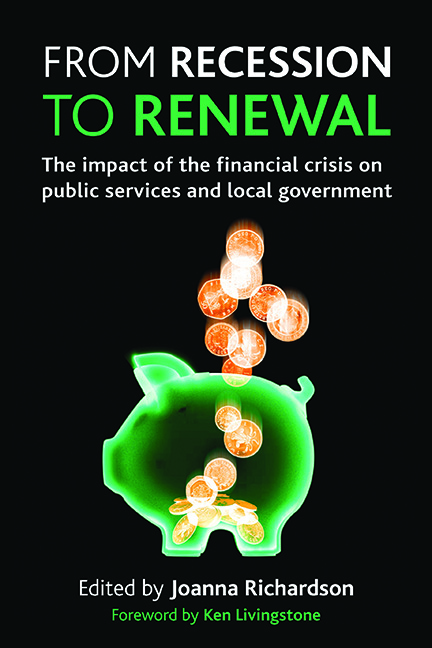 From Recession to Renewal
From Recession to Renewal five - Protecting the community from the effects of the financial crisis
Published online by Cambridge University Press: 01 September 2022
Summary
An economic slowdown is like a receding tide which reveals the many who are struggling. (Vale et al, 2009, 5)
Local authorities have been implementing cuts to public service budgets since 2008, but the Conservative–Liberal Democrat Coalition government's plans to cut over £6 billion in 2010 added pressure to an already stark situation. While some services have been protected at the centre (such as health), other local budgets are identified as being at severe risk – in particular adult social care services. Other local public services facing pressure include swimming pools, libraries, speed cameras, community centres and other cultural activities. In some areas, warden services in elderly social housing schemes continue to be threatened; and while these are not acute health services, they do comprise a package of public services intended to promote long-term health and well-being, and their reduction or closure will impact heavily on the vulnerable and the elderly.
The New Local Government Network (NLGN) in its (2010) report examined a range of public service areas that faced cuts in order to analyse the options. Individual councils are also undergoing such an exercise, with some, such as East Sussex County Council (2010a), attempting to reconcile the in-year grant reductions with existing local policies and priorities. It is evident that cuts will affect a range of services and groups and that, as stark as the situation is for 2010/11, the challenges will be even greater in future years.
This chapter starts off with a brief overview of the impact of the recession on neighbourhoods and communities, along with ideas on shielding ‘places’ and neighbourhoods from the effects of the crisis. It then examines issues such as health and housing which, although vital to the whole of society, are difficult to access or maintain in economically difficult times for a range of vulnerable people. It also aims to discuss the impact of the financial crisis on those individuals and communities who may have already been struggling before the recession, and who have been disproportionately affected since the financial crisis started, such as older people, children and Gypsies and Travellers. The challenges of social equality (Wilkinson and Pickett, 2009; Dorling, 2010) and community cohesion should be high on the agenda of a government dealing with the effects of the recession.
- Type
- Chapter
- Information
- From Recession to RenewalThe Impact of the Financial Crisis on Public Services and Local Government, pp. 89 - 110Publisher: Bristol University PressPrint publication year: 2010
